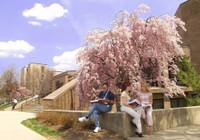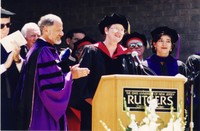
The 1990s started at Rutgers–Camden with great promise as the Campus’ capacity for student housing doubled and a state-of-the-art facility opened to house the recently founded Rutgers School of Business—Camden.

In 1991, Prof. Roger Dennis was named dean of the Rutgers School of Law–Camden; he had served as acting dean since 1989. In January 1991, the Rutgers–Camden gymnasium opened an addition, featuring new handball and racquetball courts and an auxiliary gym for intramural activities.
Two years later, the Campus Center underwent a fourth expansion which yielded a spacious new bookstore, student health facilities, and student activities offices in its new three-story wing. The Paul Robeson Library also was expanded, thanks to a 1988 bond issue. Part of the library expansion project included a wide bridge connecting the building to the law school library, which increased the size of the facility by 40%.
In 1992, Dr. Robert Catlin began directing the College of Arts and Sciences as Dr. Walter K. Gordon served as provost and dean of the Graduate School-Camden. In 1998, Dr. Margaret Marsh, a nationally known scholar of women’s history and a 1967 graduate of Rutgers–Camden, was named dean of the Faculty of Arts and Sciences. Formerly the chair of Temple University’s Department of History, Marsh began overseeing the Rutgers–Camden College of Arts and Sciences, University College, and Graduate School-Camden. Dean Marsh’s initiatives included the creation of the Center for Children and Childhood Studies and the Center for State and Constitutional Studies.

During the 1996 law school commencement ceremony, U.S. Attorney General Janet Reno urged soon-to-be lawyers to “use the law to protect others, to solve their problems. Don’t become known for the law firm you join, the money you make, the house you live in, but for your work for others. Work to build a better community as a lawyer and a layperson.”
After serving Rutgers–Camden for 35 years as provost, Dr. Walter K. Gordon retired in January 1997. His tenure had been marked by dramatic campus growth, extensive new educational opportunities for students, and a long-term commitment to excellence. In May, Rutgers School of Law—Camden Dean Roger J. Dennis was named provost.
Provost Dennis built upon his predecessor’s success with the aim of forging “a campus dedicated to the creation and dissemination of knowledge and responsive to the needs of our region, our state, and our world.” Along with fostering interdisciplinary academic efforts and building bridges among campus administrative offices, Dennis embarked on an effort to expand and beautify the campus. In 1999, work began on Gateway Park, attractive greenery at the base of the Benjamin Franklin Bridge that welcomed travelers to New Jersey, replacing a number of old structures near Rex Place and the bridge’s toll plaza. The Campus also started actively acquiring properties along Cooper Street, starting with a new home for the Alumni Relations Office in January 1999. Several other properties followed, with a goal of renovating the Victorian facades of the buildings while providing needed administrative and faculty space and maintaining the boundaries of the Campus.
Media Contact: Cathy K. Donovan
(856) 225-6627
E-mail: catkarm@camden.rutgers.edu